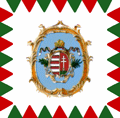 3/09/2013 - AHF commemorates Hungarian National Day and the 1848 War of Independence. The annual commemoration emphasized the relevance of Kossuth and the historic fight for democracy to today, Hungary's revered history of standing up for freedom and liberty against great odds, and the serious human and minority rights challenges facing ethnic-Hungarian communities throughout the Carpathian basin. 3/09/2013 - AHF commemorates Hungarian National Day and the 1848 War of Independence. The annual commemoration emphasized the relevance of Kossuth and the historic fight for democracy to today, Hungary's revered history of standing up for freedom and liberty against great odds, and the serious human and minority rights challenges facing ethnic-Hungarian communities throughout the Carpathian basin.
The 1848 Hungarian Revolution, under its leader Louis Kossuth sought to throw off the Austrian Yoke. It failed after Russian intervention, but its impact on the United States and Central and Eastern Europe is felt even today. 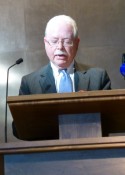 The annual commemoration of 1848, organized by the Washington, D.C. Chapter of the American Hungarian Federation was held this year on March 9th at the American University Wesley Theological Seminary Chapel. The annual commemoration of 1848, organized by the Washington, D.C. Chapter of the American Hungarian Federation was held this year on March 9th at the American University Wesley Theological Seminary Chapel.
Each year, speakers focus on the significance of the 1848 revolution and how its ideals and goals relate to today's Hungary, including the political and human rights situation in Central and Eastern Europe and relations with the United States. Zoltán Bagdy, AHF Co-President and Chair of its Cultural Affairs Committee, welcomed guests and served as Master of Ceremonies. Bryan Dawson, AHF Executive Chairman, and his daughter, Xitlalli sang the national anthems of the United States and Hungary. The Rev. Miklós Peleskey delivered the benediction followed by welcoming remarks by András Szörényi, Poltical Officer from the Hungarian Embassy.
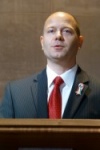 In his Welcome Address, Mr. Szörényi reflected on the transformational events of 1848 and its impact on the United States and positive relations between the two countries. He recalled Louis Kossuth's impact on Abraham Lincoln and the famed Gettysburg Address when Kossuth, in 1852, a decade prior to Lincoln's speech, spoke these words before the Ohio State Legislature: "All for the people and all by the people. Nothing about the people without the people. That is Democracy, and that is the ruling tendency of the spirit of our age." In his Welcome Address, Mr. Szörényi reflected on the transformational events of 1848 and its impact on the United States and positive relations between the two countries. He recalled Louis Kossuth's impact on Abraham Lincoln and the famed Gettysburg Address when Kossuth, in 1852, a decade prior to Lincoln's speech, spoke these words before the Ohio State Legislature: "All for the people and all by the people. Nothing about the people without the people. That is Democracy, and that is the ruling tendency of the spirit of our age."
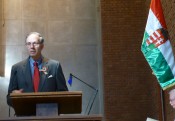 AHF President Frank Koszorus, Jr., delivered his annual "Reflections" address entitled, "Is Kossuth Relevant Today?" He described the impact of Kossuth and the ideals of the 1848 Revolution on the affect on the relationship between Hungary and the United States, the need to protect Hungary's international reputation, the extreme negative affects on that reputation when poltical motivations outweigh honest debate, and the currrent situation of discrimination and persecution facing ethnic-Hungarian communities. He commented: AHF President Frank Koszorus, Jr., delivered his annual "Reflections" address entitled, "Is Kossuth Relevant Today?" He described the impact of Kossuth and the ideals of the 1848 Revolution on the affect on the relationship between Hungary and the United States, the need to protect Hungary's international reputation, the extreme negative affects on that reputation when poltical motivations outweigh honest debate, and the currrent situation of discrimination and persecution facing ethnic-Hungarian communities. He commented:
"We still have unresolved issues to address, as liberal democracy has yet to grow strong roots everywhere in Central and Eastern Europe. Indeed, intolerance toward religious and national minorities shamefully and surprisingly still flourishes in some places.
One need only consider the Szekely flag dispute, the denial of the Hungarians’ request for autonomy, or the alarming proposals to redistrict – that is eliminate the Hungarian administrative units – of the Szekely region in Romania; or the violence against Hungarians for speaking in their mother tongue in Serbia; or the discriminatory language and citizenship laws in Slovakia; or rising anti-Semitism; and I could go on.
And this is where Kossuth’s championing liberty and democracy comes into play. We can, we must follow his example; we can, we must educate the public in our communities about these critically important matters. We can, we must educate to dispel faulty information about Hungary and Hungarian history; we can, we must vigorously support policies that will promote liberal democracy, civil societies and minority rights. Kossuth and Hungary of 1848-49 are indeed relevant today!" [download Frank's speech]
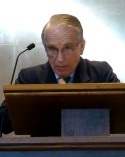 Gyula Varallyay, board member of the Hungarian American Coalition, delivered the 2013 Keynote Address. Dr. Varallyay reflected on the impact of 1848 in a fascinating historical context, commenting on how the ideals of Louis Kossuth and 1848 would be reflected laws and in future Hungarian struggles for freedom, even today. Gyula Varallyay, board member of the Hungarian American Coalition, delivered the 2013 Keynote Address. Dr. Varallyay reflected on the impact of 1848 in a fascinating historical context, commenting on how the ideals of Louis Kossuth and 1848 would be reflected laws and in future Hungarian struggles for freedom, even today. 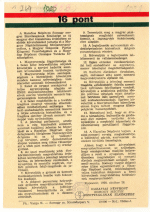 During the 1956 Hungarian Revolution, for example, the Kossuth Coat of Arms quickly became the symbol of that historic fight. But importantly, as with the 12 points in 1848, Hungarian student revolutionaries in 1956 unveiled their own, very similar series of demands known as the 16 points, which, among other things, called for March 15th to be a National Holiday and demanded that "the statue of Stalin, symbol of Stalinist tyranny and political oppression, be removed as quickly as possible and be replaced by a monument in memory of the martyred freedom fighters of 1848-49." He went on reflect on the lessons we should learn from 1848: During the 1956 Hungarian Revolution, for example, the Kossuth Coat of Arms quickly became the symbol of that historic fight. But importantly, as with the 12 points in 1848, Hungarian student revolutionaries in 1956 unveiled their own, very similar series of demands known as the 16 points, which, among other things, called for March 15th to be a National Holiday and demanded that "the statue of Stalin, symbol of Stalinist tyranny and political oppression, be removed as quickly as possible and be replaced by a monument in memory of the martyred freedom fighters of 1848-49." He went on reflect on the lessons we should learn from 1848:
-
Tiszteljük a reformkor szellemi nagyjait, költőket, írókat, politikusokat és gondolkodókat egyaránt: ugyanis 1848 márciusra a jövőről alkotott elképzeléseik kiristályosodtak, eltökélt szándékuk lett Magyarország függetlenségének kivívása, az ország modernizációja, és - a bécsi Udvar ellenére -, a nyugati szabadság eszméinek maradéktalan meghonosítása;
- Olvassuk történelmünk egyik legtehetségesebb szellemi elítjének munkáit, tanuljunk eszmeiségükből – melynek megvalósítása akkor az országot paritásba hozta volna minden nyugati országgal;
- Semmit se felejtsünk, és mindenből tanuljunk: legyünk készek arra is, hogy levonjuk a tanulságot azokból a hibákból, amelyeket politikusaink és gondolkodóink elkövettek 1848-1849-ben, akár a bécsi udvarral, a nemzeti kisebbségekkel vagy akár a magyar néppel szemben, mert túlbecsülték saját erejüket vagy alábescülték ellenfeleik – ellenségeik – elszántságát és lehetőségeit; és
- Tartsuk fenn példaképnek 1848 március idusának önzetlen szereplőit, akik abban a történelmi pillanataban készek voltak minden áldozatot meghozni, és személyes valamint csoport érdekek fölé helyezni a nemzeti érdekeket: Amit a magyarság zöme akkor kívánt!
[download Gyula's speech (English and Hungarian)].
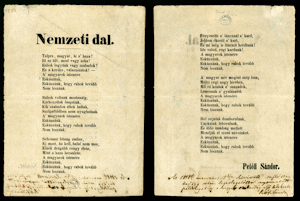 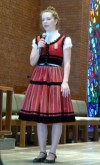 Members of the the The 4th Bátori József Hungarian Scouts Troop of Washington, DC were again a special part of the program including Hargitai Anna who recited Petőfi Sándor's Nemzeti Dal (her brother, Adam, delivered it in 2012). Isabelle Members of the the The 4th Bátori József Hungarian Scouts Troop of Washington, DC were again a special part of the program including Hargitai Anna who recited Petőfi Sándor's Nemzeti Dal (her brother, Adam, delivered it in 2012). Isabelle 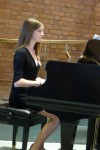 Boone preformed a piano solo of Béla Bartók folksong arrangements, "Népdal feldolgozások" and her brothers, Alexander and William, recited Petőfi Sándor's "Csatadal" and Weöres Sándor's "Megy az úton a katona" respectively. Boone preformed a piano solo of Béla Bartók folksong arrangements, "Népdal feldolgozások" and her brothers, Alexander and William, recited Petőfi Sándor's "Csatadal" and Weöres Sándor's "Megy az úton a katona" respectively.
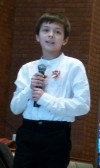 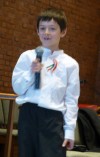 The audience sang patriotic Kosuth Dalok (Kossuth Songs). The Rev. Judit Mayer of the Hungarian Reformed Church of Washington, D.C., provided closing remarks and prayer - Bryan Dawson. The audience sang patriotic Kosuth Dalok (Kossuth Songs). The Rev. Judit Mayer of the Hungarian Reformed Church of Washington, D.C., provided closing remarks and prayer - Bryan Dawson.
Join and Support us online!

[back to all 1848 news]
[<< Back to All AHF News]
| [< back to AHF 1848 Commemorations]
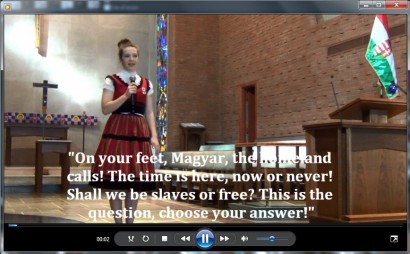
[watch the video on AHF's YouTube Channel]
Shortcuts:
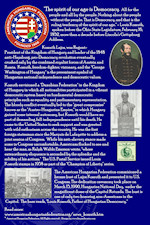
AHF presents a gift to to the American People: The Kossuth Bust in the US Capitol [read more]
|
Downloads:
Famous Quotes
 "The house of Habsburg-Lorraine, perjured in the sight of
God and man, had forfeited the Hungarian throne." "The house of Habsburg-Lorraine, perjured in the sight of
God and man, had forfeited the Hungarian throne."
Hungary, April 1849
"All for the people and all by the people. Nothing about
the people without the people. That is Democracy, and that is the ruling
tendency of the spirit of our age."
Spoken before the Ohio State Legislature,
February 16, 1852
About Louis
Kossuth
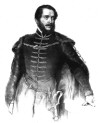 Kossuth
Lajos (b. 1802, d. 1894, pronounced co-shoot luh-yôsh) was Governor of Hungary during fight for independence and democracy which
was eventually defeated by the union of the royalist Austrian Habsburg
and Russian Czarist Armies (1848 - 1849). Kossuth envisioned a federation
in the Kingdom of Hungary in which all nationalties participated in a
vibrant democratic system based on fundamental democratic principles such
as equality and parliamentary representation. The bloody conflict eventually
led to a great compromise known as the "Austro-Hungarian Empire,"
in which Hungary gained some autonomy. although Kossuth would have no
part in it and demanded full indepependence until his death. Kossuth
Lajos (b. 1802, d. 1894, pronounced co-shoot luh-yôsh) was Governor of Hungary during fight for independence and democracy which
was eventually defeated by the union of the royalist Austrian Habsburg
and Russian Czarist Armies (1848 - 1849). Kossuth envisioned a federation
in the Kingdom of Hungary in which all nationalties participated in a
vibrant democratic system based on fundamental democratic principles such
as equality and parliamentary representation. The bloody conflict eventually
led to a great compromise known as the "Austro-Hungarian Empire,"
in which Hungary gained some autonomy. although Kossuth would have no
part in it and demanded full indepependence until his death.
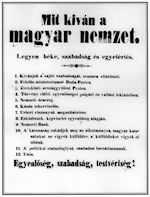 The speech from which the above excerpt is taken was given over a decade
before Lincoln's famed "for the people, by the people" speech
given at Gettysburg in 1863. Kossuth was the first foreign Statesman officially
invited to the US since the Marquis de Lafayette. His upcoming speech
in the Congress of the United States made the pre-civil war joint house
nervous due to his democratic views on equality of all men. Kossuth learned
English while in prison and exile and spoke to half the population of
the US who enthusiastically greeted and flocked to hear him. Despite Hungary's
epic struggle and Kossuth's brave and noble efforts, the US, the "Bastion
of Democracy" turned him away, empty handed. Hungary was alone again
in its fight for democracy in 1956, and didn't gain freedom until 1989 and would soon join NATO. The speech from which the above excerpt is taken was given over a decade
before Lincoln's famed "for the people, by the people" speech
given at Gettysburg in 1863. Kossuth was the first foreign Statesman officially
invited to the US since the Marquis de Lafayette. His upcoming speech
in the Congress of the United States made the pre-civil war joint house
nervous due to his democratic views on equality of all men. Kossuth learned
English while in prison and exile and spoke to half the population of
the US who enthusiastically greeted and flocked to hear him. Despite Hungary's
epic struggle and Kossuth's brave and noble efforts, the US, the "Bastion
of Democracy" turned him away, empty handed. Hungary was alone again
in its fight for democracy in 1956, and didn't gain freedom until 1989 and would soon join NATO.
Today, there are many reminders of Kossuth's impact on America and the
world. In North America, there is a Kossuth County in the state of Iowa,
a town with his name in Indiana, Ohio and Mississippi,
a settlement with a Kossuth Post Office is in Pennsylvania. In addition,
there are Kossuth statues and plaques in New York, Cleveland, Akron, New
Orleans, Washington, and Ontario, Canada. The Hungarian
Reformed Federation's building on Dupont Circle, in Washington, DC
is called Kossuth House with a memorial plaque commemorating his speech
on democracy. See the picture gallery and memorials on Louis
Kossuth in North America.
The renowned Ralph Waldo Emerson said in greeting Kossuth on his arrival
at Concord, MA, May 11, 1852:
"[we] have been hungry to see the man whose extraordinary eloquence
is seconded by the splendor and the solidity of his actions."
Kossuth was greeted with wild enthusiasm across the country. He was only
the second foreign leader (second to Lafayette) to address a joint session
of Congress. The American Hungarian Federation dedicated a bust that now sits proudly in the US Capitol - it reads, "Louis
Kossuth, Father of Hungarian Democracy" [read more]
Audio
Resources
 Hear
Louis Kossuth Speak! [Click Here] - This is the speech of Louis Kossuth which he gave for the dedication of the statue for the 13 Hungarian generals, who were executed at Arad, Hungary, on October 6, 1849 (Arad is in Rumania today after annexation due to the Treaty of Trianon in 1920 ).
Louis Kossuth was exiled after the fall of the Hungarian Liberation Fight of 1848 and made his permanent home in Torino (Turin), Italy. He could not attend the dedication of the monument at Arad, without risking arrest, so he recorded his speech inTurin, and sent it to Arad using the new technology of sound recording, called the phonograph. Hear
Louis Kossuth Speak! [Click Here] - This is the speech of Louis Kossuth which he gave for the dedication of the statue for the 13 Hungarian generals, who were executed at Arad, Hungary, on October 6, 1849 (Arad is in Rumania today after annexation due to the Treaty of Trianon in 1920 ).
Louis Kossuth was exiled after the fall of the Hungarian Liberation Fight of 1848 and made his permanent home in Torino (Turin), Italy. He could not attend the dedication of the monument at Arad, without risking arrest, so he recorded his speech inTurin, and sent it to Arad using the new technology of sound recording, called the phonograph.
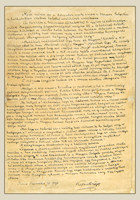 The recording was made on September 20, 1890, when Kossuth was 88 years old. It is a sad fact that the monument Kossuth sent his speech for was torn down by the Rumanian government when they annexed Transylvania, along with Arad, in 1920, after World War I. The recording was made on September 20, 1890, when Kossuth was 88 years old. It is a sad fact that the monument Kossuth sent his speech for was torn down by the Rumanian government when they annexed Transylvania, along with Arad, in 1920, after World War I.
The original
recording on two wax cylinders for the Edison phonograph survives to this
day, although barely audible due to excess playback and unsuccessful early
restoration attempts. Lajos Kossuth is the earliest born person
in the world who has his voice preserved. Since the audio
is of such poor quality, here is it is transcribed in Hungarian and translated
to English (special thanks to Louis
Kossuth in North America)
Hungarian |
English |
"A világ bírája
a történelem fog e kérdésre felelni. Legyenek
a szentemlékû vértanúk megáldottak
poraikban, szellemeikben a hon szabadság Istenének
legjobb áldásaival az örökkévalóságon
keresztül; engem ki nem borulhatok le a Magyar Golgota porába,
engem október 6-a térdeimre borulva fog hontalanságom
remete lakában látni a mint az engem kitagadott Haza
felé nyújtva agg karjaimat a hála hû
érzelmeivel áldom a vértanúk szent emlékét
hûségükért a Haza iránt, 's a magasztos
példáért, melyet az utódoknak adtanak;
's buzgó imával kérem a magyarok Istenét,
hogy tegye diadalmassá a velõkig ható szózatot,
mely Hungária ajkairól a Magyar Nemzethez zeng. Úgy
legyen Ámen!
Turin
September 20 1890
Kossuth Lajos |
"The judge of the universe,
history, will decide over this question. Should the saintly remembered
martyrs be hallowed in their ashes, in their spirit with the highest
blessings of the Lord of Liberty and through eternity; I can not
pay my sympathies to the ashes of the Hungarian Golgotha, but October
6 will find me on my knees in this reclusive home of exile, as I
open my arms to my disowning homeland. With gratitude's faithful
sentiments, I bless the martyrs' sacred memory for their faith in
their homeland and for the sublime example they left to their heirs:
with ardent prayer I beg the God of Hungarians to make their appeal
which echoes from the lips of Hungaria to the Hungarian Nation.
So be it, Amen!
Turin
September 20 1890
Lajos Kossuth |
|
Click to hear the recording: |
"Kossuth Lajos azt üzente,
elfogyott a regimentje.
Ha még egyszer azt üzeni,
mindnyájunknak el kell menni,
Éljen a magyar szabadság,
Éljen a haza ! |
Esik esõ karikára,
Kossuth Lajos kalapjára.
Valahány csepp esik rája,
Annyi áldás szálljon rája,
Éljen a magyar szabadság,
Éljen a haza!" |
Links
- AHF and the Kossuth Bust in the US Capitol
- AHF commemorating 1848
- President Bush Honors 1848 and Hungary's Contributions to Democracy
- HRFA's excellent Kossuth in America [visit]
- Select Speeches of Kossuth, Condensed and Abridged, with Kossuth's
Express Sanction [visit]
- Louis Kossuth, Mason And Apostle Of World Democracy [visit]
- Count Apponyi's Oration on the Death of Louis Kossuth [visit]
- Wikipedia - [visit]
and add your thoughts!
- Louis Kossuth in North America [visit]
- Kossuth County, Iowa [visit]
- Kossuth County, Iowa statue dedication
[visit]
- Dedication of statue to replace one destroyed by
Rumanian occupation
forces in 1921:
Gyergyócsomafalva, Transylvania [visit]
|



